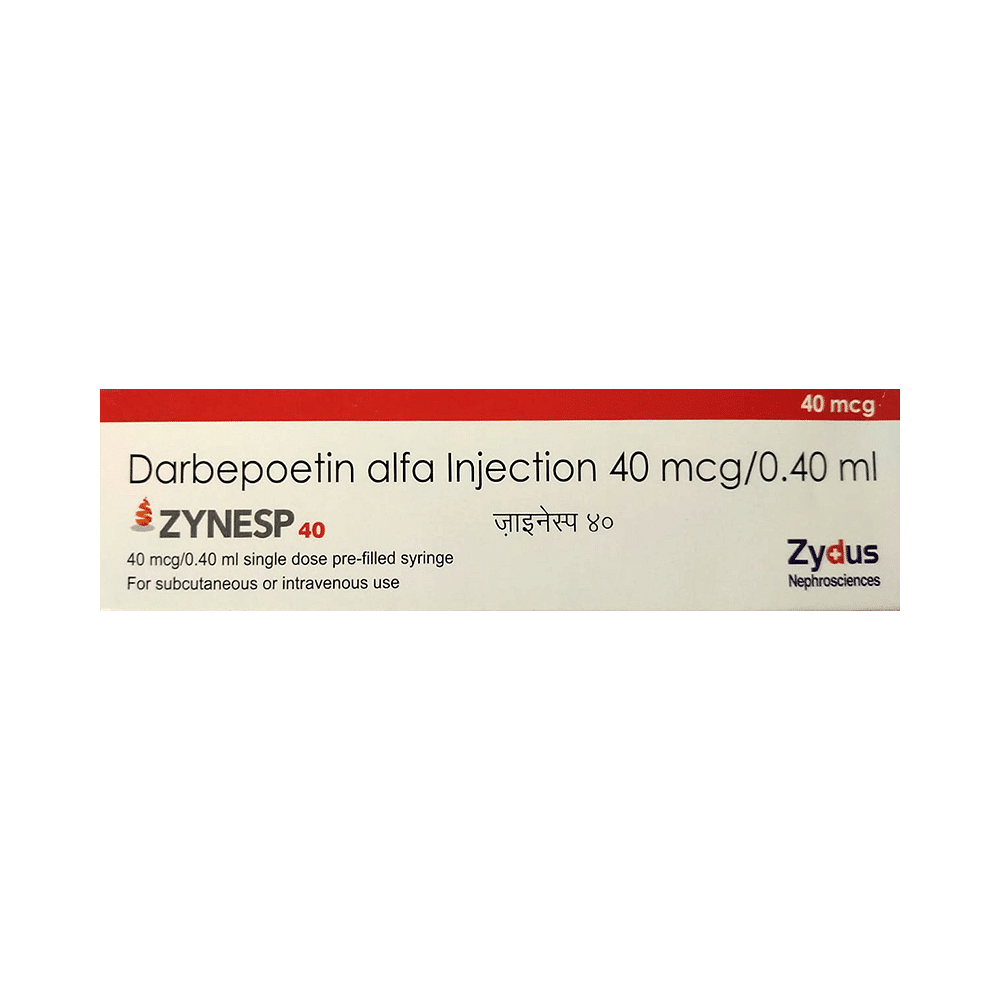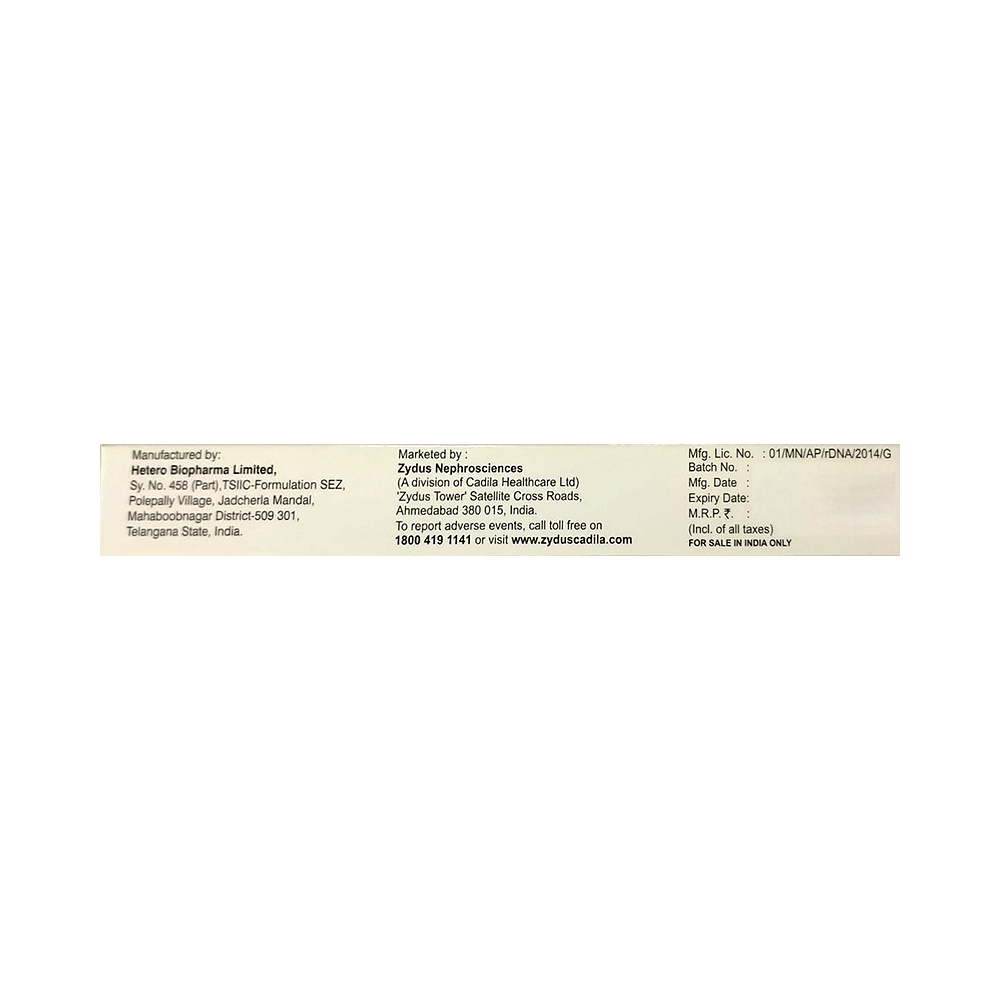


Zynesp 40 Injection
Manufacturer
Zydus Cadila
Salt Composition
Darbepoetin alfa (40mcg)
Key Information
Short Description
Zynesp 40 Injection is used to treat anemia caused by chronic kidney disease or chemotherapy by stimulating the bone marrow to produce more red blood cells.
Dosage Form
Injection
Introduction
Zynesp 40 Injection is a medicine that needs to be used with utmost care because it can lead to serious side effects. It is important that you seek treatment from a doctor who is experienced in providing this medical therapy. You should follow all the directions of the doctor strictly. It is given under the supervision of a healthcare professional. Common side effects include abdominal pain, high blood pressure, rash, injection site pain, breathlessness, cough, and peripheral edema. Inform your doctor if there are symptoms of very high blood pressure such as severe headache, problems with your eyesight, nausea, vomiting, or fits (seizures). Your doctor may get your blood tests done regularly to monitor the levels of salts (electrolytes such as potassium), hemoglobin, and blood cells in your blood. You should stop taking it and consult with a doctor if you develop shortness of breath or skin rash. Before taking Zynesp 40 Injection, tell your doctor if you have heart disease, high blood pressure, or have had a seizure or stroke. If you are pregnant or breastfeeding, or plan to become pregnant or breastfeed, consult your doctor to make sure it is safe for you.
Directions for Use
Your doctor or nurse will give you this medicine. Kindly do not self-administer.
How it works
Zynesp 40 Injection is an erythropoiesis-stimulating agent (ESA). It works by stimulating the bone marrow (soft tissue inside the bones which produces red blood cells) to produce more red blood cells.
Quick Tips
Zynesp 40 Injection helps in the treatment of anemia that may have occurred due to chronic kidney disease or cancer chemotherapy. It is given as a single injection under your skin It can be given intravenously. Your doctor may get your blood tests done regularly to monitor the levels of hemoglobin and blood cells in your blood. Stop taking Zynesp 40 Injection and inform your doctor if you develop shortness of breath or skin rash.
Frequently asked questions
How long does it take for Zynesp 40 Injection to start working?
You may notice an increase in red blood cell count (hemoglobin levels) within 2-6 weeks of starting Zynesp 40 Injection. It is important to consult your healthcare professional with any questions regarding treatment.
Is Zynesp 40 Injection safe to use?
Zynesp 40 Injection is a medication that requires careful consideration due to its potential for serious side effects and the possibility of death. It is imperative to receive treatment from a doctor with expertise in Zynesp 40 Injection therapy. Follow all prescribed instructions diligently.
What other reasons might cause lack of response to Zynesp 40 Injection?
You may not respond to Zynesp 40 Injection due to deficiencies in iron, folic acid or vitamin B12. It is crucial to address these deficiencies with appropriate interventions. Other potential reasons for inadequate treatment response might include bleeding, infections, inflammation and bone marrow fibrosis. Consult your healthcare professional regarding the matter.
Can Zynesp 40 Injection be used in children?
Yes, Zynesp 40 Injection is used to treat anemia related to chronic kidney disease in children aged 1 year or older. However, efficacy and potential side effects in children are similar to those observed in adults. Always consult your healthcare provider for clarification.
Can Zynesp 40 Injection affect blood pressure?
Yes, Zynesp 40 Injection can influence blood pressure. During the initial phase of treatment with Zynesp 40 Injection, blood pressure monitoring is essential for those with high blood pressure. In such cases, necessary measures should be taken to control blood pressure, and your doctor may adjust or stop Zynesp 40 Injection if blood pressure remains uncontrolled.
Who should not take Zynesp 40 Injection?
Individuals with cancer who have not received a doctor's prescription for Zynesp 40 Injection should avoid using it. Additionally, patients with uncontrolled hypertension (high blood pressure), those with a history of anemia called pure red cell aplasia (PRCA) that begins after treatment with Zynesp 40 Injection or other erythropoietin medications, and individuals who have experienced a serious allergic reaction to this medication should refrain from using it.


